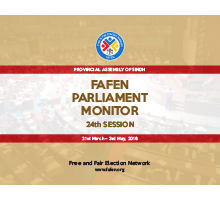The Sindh Assembly passed 13 bills and adopted nine resolutions during its 24th session, says Free and Fair Election Network in its session report based on direct observation of proceedings of the Sindh Assembly.
Out of 16 bills on list of business during the session, the House passed 13 government bills of which seven were about new legislation and six bills sought amendments in the existing laws. A government bill- the Societies Registration (Sindh Amendment) Bill, 2015 – was not taken up the House.
One private bill – the Lyari Development Authority (Amendment) Bill, 2016 – was rejected by the House while another – the Malir Development Authority (Amendment) Bill, 2016 – was not taken up by the House.
The bills passed by the House included the Karachi Development Authority (Revival and Amending) Bill, 2016; the Sindh Factories Bill, 2015; the Sindh Terms of Employment (Standing Orders) Bill, 2015; the Sindh Shops and Commercial Establishment Bill, 2015; the Sindh Service Tribunals (Amendment) Bill, 2016; the Sindh Companies Profits (Workers’ Participation) Bill, 2015; the Benazir Bhutto Shaheed University of Technology and Skill Development Khairpur Bill, 2016; the Sindh Local Government (Second Amendment) Bill, 2016; the Sindh Local Government (Fourth Amendment) Bill, 2016; the Sindh Local Government (Third Amendment) Bill, 2016; the Sindh Employees’ old-age Benefits (Amendment) Bill, 2016; the Sindh Senior Citizens Welfare Bill, 2014 and the Sindh Bonded Labor System (abolition) Bill, 2015.
The session, comprising seventeen sittings, started on March 21 and concluded on May 3, 2016. It was marked by low attendance of lawmakers as an average of 32 (20%) members remained present at the outset and 53 (33%) at the end of each sitting. Three minority members, on average, attended each sitting of the session. On average, each sitting started 65 minutes behind the schedule and lasted two hours and 28 minutes. The longest sitting on April 26 lasted four hours and 23 minutes and the shortest sitting for only two minutes was held on May 25, 2016.
The Speaker attended 16 sittings and chaired the 70 percent of session time while the Deputy Speaker attending eight sittings presiding over 21 percent of the session. Eight percent of total session time was chaired by a member of Panel of Chairpersons while one percent time was consumed in breaks.
The Chief Minister (Leader of the House) attended seven sittings and participated in 18% of session’s proceeding while the Leader of the Opposition was present in 8 sittings attending 26% of the proceeding time. Parliamentary leaders of PPPP attended 15 sittings followed by PML-N (14), PTI and PML-F (14 each). The Parliamentary Leader of NPP did not attended any sitting during the session.
The House adopted a total of nine out of 21 resolutions appearing on the ‘Orders of the Day’ during the session. Among adopted resolutions, four were on the issues of governance followed by education sector, tributes and condolence (two each), and one on the issue of energy.
The lawmakers raised 39 Calling Attention Notices (CANs) during the session of which 32 were taken up and responded to by the relevant Ministers on floor of the House and the remaining seven CANs were left unaddressed.
Among responded CANs, 12 were addressed to Local Government followed by Health Department; Home Department (five each), Education and Literature (3), and one each was related to Excise and Taxation, Finance Department, Revenue Department, Services and General Administration Department, Transport, Wildlife and Works and Services Departments.
Members asked 68 questions from different departments out of which 46 starred questions were taken up on the floor of the House and responded to by the relevant Ministers. The remaining 22 starred questions were left unaddressed due to absence of government representatives or their movers. Members also asked 219 supplementary questions during different sittings of the session.
A party wise detail of raised questions indicates that members belonging to PML-F raised 28 questions followed by MQM (26), PTI (8), and PPPP (6). Lawmakers belonging to PML-N did not raise any question during the session.
Lawmakers raised 136 Points of Order (POs) that consumed 172 minutes of the session time. The maximum number of POs (23) was raised during fourth sitting consuming 23 minutes of proceeding while the lowest number of PO (one) was raised during 9th sitting that consumed one minute of the sitting time.
The House witnessed the presentation of eight reports while four reports were granted extension by the House during the session. A report on the appropriation accounts of provincial department was referred to relevant standing committee while two other reports of the standing committees on bills that appeared on the list of business were not taken up by the House during the aforementioned period.
Reports laid before the House included four recommendation reports of the standing committees on legislations, a report about action taken by various provincial departments on the resolutions passed by the House from 2013 to 2016, one audit report and a quarterly report on receipts of province current revenue, capital and development expenditures during 2015-16.
The House witnessed five incidents of protest and three walkouts during the session that consumed 77 minutes of the session time. During last two sittings, MQM lawmakers staged a series of protest and walkout enforcing the Chair to adjourn the House without transacting its complete business.
Lawmakers submitted six privilege motions during the session of which one was rejected and as many was referred to the relevant standing committee. From the remaining motions two were withdrawn by the movers while another two were not taken up by the House.
To download complete report, click here


